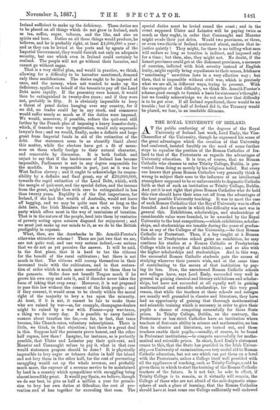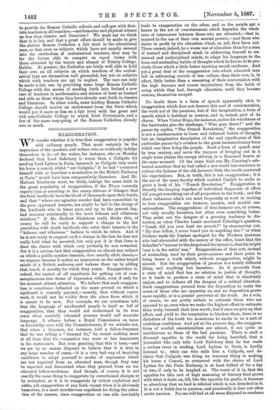THE ROYAL UNIVERSITY OF IRELAND.
AT the public conferring of the degrees of the Royal University of Ireland last week, Lord Emly, the Vice- Chancellor of the University, though he expressed his sense of the great advantages which the creation of that University had conferred, insisted forcibly on the need of some further steps to equalise the position of the Roman Catholics of Ire- land to that of the Protestants as regards the advantages of University education. It is true, of course, that no Roman Catholic who chooses to enter Trinity College, Dublin, is pre- vented from doing so merely by his religious belief. But every one knows that pious Roman Catholics very generally think it wrong to subject their sons to the influence of an intellectual atmosphere supposed to be so unfavourable to dogmatic Catholic faith as that of such an institution as Trinity College, Dublin. And yet it is not right that pious Roman Catholics who do hold this view should have their sons cut off from the advantages of the best possible University teaching. It was to meet the case of such Roman Catholics that the Royal University was in effect founded. And the mode in which the difficulty was met was in general this. Exhibitions, scholarships, and studentships of considerable value were founded, to be awarded by the Royal University to the beat competitors,—which exhibitions, scholar- ships, and studentships are tenable during the years of gradua- tion at any of the Colleges of the University,—be they Roman Catholic or Protestant. Thus, if a boy taught at a Roman Catholic or Presbyterian school gains an exhibition, he may continue his studies at a Roman Catholic or Presbyterian College while in receipt of that exhibition ; and so also with the higher scholarships and studentships. And in this way, the successful Roman Catholic students gain the means of studying wherever their parents wish, and at the same time of contributing to the means of that institution by pay- ing its fees. Now, the unendowed Roman Catholic schools and colleges have, says Lord Emly, succeeded very well in general in gaining classical and literary exhibitions and scholar- ships, but have not succeeded at all equally well in gaining mathematical and scientific scholarships, for this very good reason, that while the teachers at these schools and colleges are usually well grounded in classics and literature, they have had no opportunity of gaining that thorough mathematical and scientific training which is necessary in order to give their pupils a chance of competing successfully for these State prizes. In Trinity College, Dublin, on the contrary, the Protestants or less strict Catholics have an institution where teachers of first-rate ability in science and mathematics, no less than in classics and literature, are turned out, and these teachers enable their pupils,—usually, of course, to be found in Protestant institutiona—to compete successfully for mathe- matical and scientific prizes. In short, Lord Emly's statement comes to this, that the State has provided in the Irish Univer- sity,—a University of examination,—a very useful aid to Roman Catholic education, but not one which can put them on a level with the Protestants, unless a College itself well provided with all the appliances of teaching, such as Trinity College, could be given them in which to start the training of the Roman Catholic teachers of the future. Is it not fair, he asks in effect, if Trinity College is to remain, as it virtually will remain, the College of those who are not afraid of the anti-dogmatic atmo- sphere of such a place of learning, that the Roman Catholics should have at least some one College sufficiently well endowed to provide the Roman Catholic schools and colleges with first- rate teachers in all branches,—mathematics and physical science no less than classics and literature We must say we think that it is fair, and that a great effort should be made to give the stricter Roman Catholics a fair start in the educational race, so that even on subjects which have not usually entered into the curriculum of ecclesiastical teachers, they may be for the future able to compete on equal terms with those educated by the tutors and alumni of Trinity College. Dublin. At present, the Catholics are fairly well able to hold their own on all subjects on which teachers of the ecclesi- astical type are themselves well grounded, but not on subjects which such teachers are apt to neglect. The race can only be made a fair one by providing some large Roman Catholic College with the means of sending forth into Ireland a new race of teachers in mathematics and science at least as learned and able as those whom they have already sent forth in classics and literature. In other words, some leading Roman Catholic College should receive an endowment from the State which would put it more or less on a fair level with the great and rich non-Catholic College to which Irish Protestants, and a few of the more easy-going of the Roman Catholics, already owe so much.



















































 Previous page
Previous page